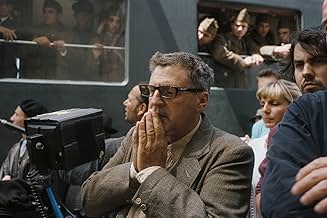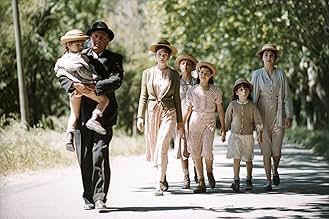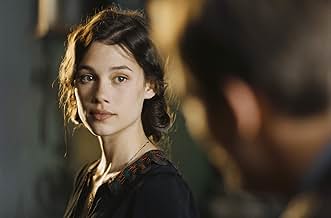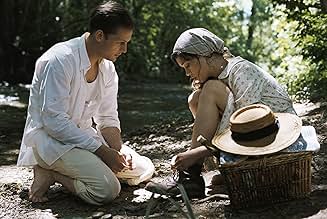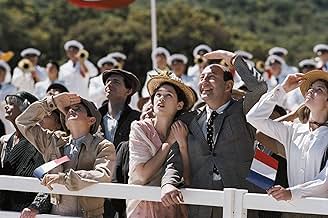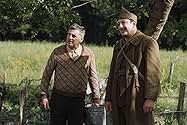IMDb-BEWERTUNG
7,0/10
4342
IHRE BEWERTUNG
Im Südfrankreich der 1930er Jahre ist ein Vater zwischen seinem Ehrgefühl und seiner tiefen Liebe zu seiner Tochter hin und her gerissen, als sie mit dem wohlhabenden Sohn eines Ladenbesitze... Alles lesenIm Südfrankreich der 1930er Jahre ist ein Vater zwischen seinem Ehrgefühl und seiner tiefen Liebe zu seiner Tochter hin und her gerissen, als sie mit dem wohlhabenden Sohn eines Ladenbesitzers in Schwierigkeiten gerät.Im Südfrankreich der 1930er Jahre ist ein Vater zwischen seinem Ehrgefühl und seiner tiefen Liebe zu seiner Tochter hin und her gerissen, als sie mit dem wohlhabenden Sohn eines Ladenbesitzers in Schwierigkeiten gerät.
- Regie
- Drehbuch
- Hauptbesetzung
- Auszeichnungen
- 2 wins total
Empfohlene Bewertungen
This marvelous film is based on a Pagnol novel which I had never heard of. Maybe it's well-known in France and so the title is familiar to audiences there. But in the US "The Well Digger's Daughter" should keep people away from this film in droves. In fact, the film is an old fashioned fable set in the French countryside during the period of World War I. Even though the plot turns are seen coming a mile away, the film has such charm and simple feeling and wisdom, that there is enormous pleasure in watching the story unfold. Auteuil is perfect as the father, as is every other actor, especially Astrid Bergès-Frisbey as the daughter of the title and Nicolas Duvauchelle as her 'prince'. And the music by Andre Desplat is one of his best scores. The setting and the lives of the characters are so beautifully depicted, there is so much pleasure to be had in entering their world for two hours, that it seems a shame that American audiences will have to overcome their disinclination to see a movie about a well-digger and his daughter when there is this rich and deeply emotional story waiting for them in the cinema.
The Well Digger's Daughter (2011)
A drama set in the early 20th Century that ends up being about traditions and love and how two different kinds of families come to understand each other. While not a Romeo and Juliet story at all, it has that basic problem when two young people from different social realms fall in love.
What keeps this from becoming commonplace is the beauty of it all, including what I would call beautiful acting--heartfelt, nuanced, interesting. In a way it is the well digger, the dad played by Daniel Autueil who is the main character. He's a familiar face (if not name) to those who have seen a few French films, and he's wonderful. Though a practical man (he digs wells the old fashioned way for a living), he has a sense of dignity and honor that impresses even the rich family whose charming son has seduced the title character.
We feel no violation here, just the normal confused crossed-star love issues. War intrudes, and then the dreaded report from the front, and the families still have to cope together. For reasons you'll see.
Marcel Pagnol, the great mid-Century French writer whose story is the basis for this, was also a filmmaker, and you can feel a kind of homage or influence at play here, which adds yet another layer of appreciation.
It's also a really funny movie, one of the dramas that is so witty and warm you laugh along with the characters like you would your friends (assuming you have funny friends). I loved the whole experience. If it ends with a feeling like, okay, all is resolved one way or another, I guess that's fine. There is no epiphany here, but rather a sweet slice of life from a provincial time we'd love to never forget.
A drama set in the early 20th Century that ends up being about traditions and love and how two different kinds of families come to understand each other. While not a Romeo and Juliet story at all, it has that basic problem when two young people from different social realms fall in love.
What keeps this from becoming commonplace is the beauty of it all, including what I would call beautiful acting--heartfelt, nuanced, interesting. In a way it is the well digger, the dad played by Daniel Autueil who is the main character. He's a familiar face (if not name) to those who have seen a few French films, and he's wonderful. Though a practical man (he digs wells the old fashioned way for a living), he has a sense of dignity and honor that impresses even the rich family whose charming son has seduced the title character.
We feel no violation here, just the normal confused crossed-star love issues. War intrudes, and then the dreaded report from the front, and the families still have to cope together. For reasons you'll see.
Marcel Pagnol, the great mid-Century French writer whose story is the basis for this, was also a filmmaker, and you can feel a kind of homage or influence at play here, which adds yet another layer of appreciation.
It's also a really funny movie, one of the dramas that is so witty and warm you laugh along with the characters like you would your friends (assuming you have funny friends). I loved the whole experience. If it ends with a feeling like, okay, all is resolved one way or another, I guess that's fine. There is no epiphany here, but rather a sweet slice of life from a provincial time we'd love to never forget.
Another reviewer has rightly pointed out that the title of this film in English is going to keep audiences away from the English-speaking cinemas in droves. But the original French title of which it is a translation, LA FILLE DU PUISATIER, had to be retained in France. That is because it is a remake of a famous and classic film of 1940 directed by Marcel Pagnol from his own novel, and thus it needed to have the same title, so that French people would know what it was. The screenplay adaptation of the remake is by Daniel Auteuil, who also directed the film and starred in it (playing the part of the well-digger). Auteuil, one of France's most famous actors, has a long history of association with Marcel Pagnol's tales of early 20th century Provence. Those who like French movies will certainly remember the pair of immensely popular films based on Pagnol novels which were directed by Claude Berri and starred Daniel Auteuil, JEAN DE FLORETTE and MANON DES SOURCES (both 1986). At the moment three further Pagnol remakes are being filmed, with Auteuil in the leading role of César, of Pagnol's famous trilogy of films, known as 'The Marseilles Trilogy'. The individual tiles of the trilogy are CÉSAR, FANNY, and MARIUS. Let us hope that a full-fledged Pagnol revival gets going, as the old films as well as the new are a pure delight. Credit for keeping the flame alive must go to Pagnol's remarkable daughter, whom I visited long ago in her office on the far side of the Periphérique. She is a powerful and determined personality and she kept the old Pagnol films in distribution and arranged for all the new ones to be made, and is a fierce guardian of the integrity and continuity of the family's creative flame. The Pagnol films are about 'real people' in the South of France, where Pagnol came from, and the thick accents in the Marseilles Trilogy are a marvel to the ear, and as different from Parisian French as a Mississippi drawl is from the speech of an inhabitant of Brooklyn, or as an impenetrable Glasgow accent is from the way they speak in London. This film is a pure delight, beautifully directed by Auteuil, and featuring as his eldest daughter (the one of the title) a fresh young actress of the utmost charm named Astrid Bergès-Frisbey, aged 25, who is part Spanish and as beautiful as a rose petal sparking with Provencal dew in the morning. The story allows her to have been sent away and educated in Paris, to explain why she does not speak like the locals. She is absolutely perfect casting, has all the right qualities for the part, and does a wonderful job. Auteuil is, as usual, superb. The rest of the cast are also excellent. This is a very poignant and emotional tale, as Pagnol stories usually are, and I would rate it as an instant classic. Everyone should see it, though outside of France, I wonder how many really will. It would be a shame for anyone who enjoys and looks forward to a superb French film to miss it, as this is in the top rank.
A wonderful cast facilitate Daniel Auteuil's vision of wartime France in this gentle, love-filled drama/comedy about a working man's attempt to maintain the honour of his family after his eldest of six daughters go astray.
Pascal has always wanted a son, but finds himself a hard-working widowed father of six daughters instead. When the son of local bourgeoisie, the Mazels, seduces his daughter before being packed off to war, Pascal and his daughter are ill-treated by the frosty Mazels. Pascal learns not to trust people "who sell tools, but never use them." But he is also honorable, exiling his disgraced daughter Patricia, who herself refuses compromise by rejecting the repeated proposals of her father's co-worker Félipe, an honest, industrious, but prosaic individual. Pascal has honour, but Félipe has love. The war intervenes in events, not once but several times, becoming a catalyst that brings to resolution the feud between the two families from opposite classes.
Auteuil handles the comedy effortlessly, but also shows depth and steel when darker tones are needed, such as handling the humiliations dished out carelessly by the shallow, emotionally volatile Mrs. Mazel. Astrid Bergès-Frisbey is simply superb as the much-wronged Patricia. Her expression when waiting by the church for a lover she believes has spurned her is exquisitely pained.
The direction keeps most of the action outdoors or in daytime, allowing Provence to glimmer and shine. There are small moments of poetry here; Pascal turn-taking a kiss with his youngest daughter as they wait for guests;interactions with a baby who melts everyone's heart, cast and audience alike; the strong bond of friendship between Pascal and Félipe.
This is a well-crafted tale of love, family, work and honour that never gets too sentimental and earns the many tears and smiles it evokes. An uplifting, joyful film, and we all need one of those from time to time.
Pascal has always wanted a son, but finds himself a hard-working widowed father of six daughters instead. When the son of local bourgeoisie, the Mazels, seduces his daughter before being packed off to war, Pascal and his daughter are ill-treated by the frosty Mazels. Pascal learns not to trust people "who sell tools, but never use them." But he is also honorable, exiling his disgraced daughter Patricia, who herself refuses compromise by rejecting the repeated proposals of her father's co-worker Félipe, an honest, industrious, but prosaic individual. Pascal has honour, but Félipe has love. The war intervenes in events, not once but several times, becoming a catalyst that brings to resolution the feud between the two families from opposite classes.
Auteuil handles the comedy effortlessly, but also shows depth and steel when darker tones are needed, such as handling the humiliations dished out carelessly by the shallow, emotionally volatile Mrs. Mazel. Astrid Bergès-Frisbey is simply superb as the much-wronged Patricia. Her expression when waiting by the church for a lover she believes has spurned her is exquisitely pained.
The direction keeps most of the action outdoors or in daytime, allowing Provence to glimmer and shine. There are small moments of poetry here; Pascal turn-taking a kiss with his youngest daughter as they wait for guests;interactions with a baby who melts everyone's heart, cast and audience alike; the strong bond of friendship between Pascal and Félipe.
This is a well-crafted tale of love, family, work and honour that never gets too sentimental and earns the many tears and smiles it evokes. An uplifting, joyful film, and we all need one of those from time to time.
The Well-Digger's Daughter is a french movie, remake of another famous french film of the 40's.
If you don't know anything about french cinema, know that this remake features well known comedians such as Daniel Auteuil (it's also his first work as a director), Kad Merad, Nicolas Duvauchelle, Jean-Pierre Darroussin, Sabine Azema, and Marie-Anne Chazel.
The original film was directed, written and produced by Marcel Pagnol, famous not only for his films but also for plays and novels that have become classics.
The remake definitely honors the classic, and I can't find one single thing to criticize. The actors all deliver moving and natural compositions, from the loving and torn father (Auteuil) to the moody Mrs Mazel (Azema), from the benevolent Felipe (Merad) to the seductive Jacques (Duvauchelle). By the way, it certainly isn't hard to see why the heroine falls for him after just one encounter ;) The main character, Patricia, is played with tact and sweetness by Astrid Bergès-Frisbey, who somehow reminds me of Jane March. She was unknown before this role (even if it's not her first), but no doubt this is the year of her breakthrough, as she will soon be seen interpreting a mermaid in the next Pirates of the Caribbean.
The direction is precise, careful, and manages to capture each small emotion of the characters. It really serves well the beautiful and moving plot. You're completely immersed into the story and can have your eyes wet more than once, even though the movie isn't a melodrama nor a tragedy. This story is timeless, and universal. I would recommend it to absolutely everyone. It's a 5-star film!
If you don't know anything about french cinema, know that this remake features well known comedians such as Daniel Auteuil (it's also his first work as a director), Kad Merad, Nicolas Duvauchelle, Jean-Pierre Darroussin, Sabine Azema, and Marie-Anne Chazel.
The original film was directed, written and produced by Marcel Pagnol, famous not only for his films but also for plays and novels that have become classics.
The remake definitely honors the classic, and I can't find one single thing to criticize. The actors all deliver moving and natural compositions, from the loving and torn father (Auteuil) to the moody Mrs Mazel (Azema), from the benevolent Felipe (Merad) to the seductive Jacques (Duvauchelle). By the way, it certainly isn't hard to see why the heroine falls for him after just one encounter ;) The main character, Patricia, is played with tact and sweetness by Astrid Bergès-Frisbey, who somehow reminds me of Jane March. She was unknown before this role (even if it's not her first), but no doubt this is the year of her breakthrough, as she will soon be seen interpreting a mermaid in the next Pirates of the Caribbean.
The direction is precise, careful, and manages to capture each small emotion of the characters. It really serves well the beautiful and moving plot. You're completely immersed into the story and can have your eyes wet more than once, even though the movie isn't a melodrama nor a tragedy. This story is timeless, and universal. I would recommend it to absolutely everyone. It's a 5-star film!
Wusstest du schon
- WissenswertesJacques' motorcycle is a Triumph Speed Twin 5T.
- PatzerWhen Pascal visits her sister Nathalie to check on Patricia, Nathalie is heard humming Nina Rota's Romeo and Juliet theme, which wasn't written until 1968.
- VerbindungenRemake of Die Tochter des Brunnenbauers (1940)
- SoundtracksCore 'n Grato
Written by Salvatore Cardillo and Alessandro Sisca
© BMG Ricordi Publishing
Avec l'autorisation d'Universal Music Vision
Sung by Enrico Caruso
(p) Recorded prior to 1972. All right reserved by BMG Music
Avec l'aimable autorisation de Sony Music Entertainment France
Top-Auswahl
Melde dich zum Bewerten an und greife auf die Watchlist für personalisierte Empfehlungen zu.
- How long is The Well-Digger's Daughter?Powered by Alexa
Details
- Erscheinungsdatum
- Herkunftsland
- Offizielle Standorte
- Sprache
- Auch bekannt als
- The Well-Digger's Daughter
- Drehorte
- Chapelle Saint-Sixte, Eygalières, Bouches-du-Rhône, Frankreich(some exteriors)
- Produktionsfirmen
- Weitere beteiligte Unternehmen bei IMDbPro anzeigen
Box Office
- Budget
- 12.500.041 € (geschätzt)
- Bruttoertrag in den USA und Kanada
- 386.368 $
- Eröffnungswochenende in den USA und in Kanada
- 10.273 $
- 22. Juli 2012
- Weltweiter Bruttoertrag
- 13.194.167 $
- Laufzeit1 Stunde 49 Minuten
- Farbe
- Sound-Mix
- Seitenverhältnis
- 1.85 : 1
Zu dieser Seite beitragen
Bearbeitung vorschlagen oder fehlenden Inhalt hinzufügen

Oberste Lücke
By what name was La fille du puisatier (2011) officially released in Japan in Japanese?
Antwort

